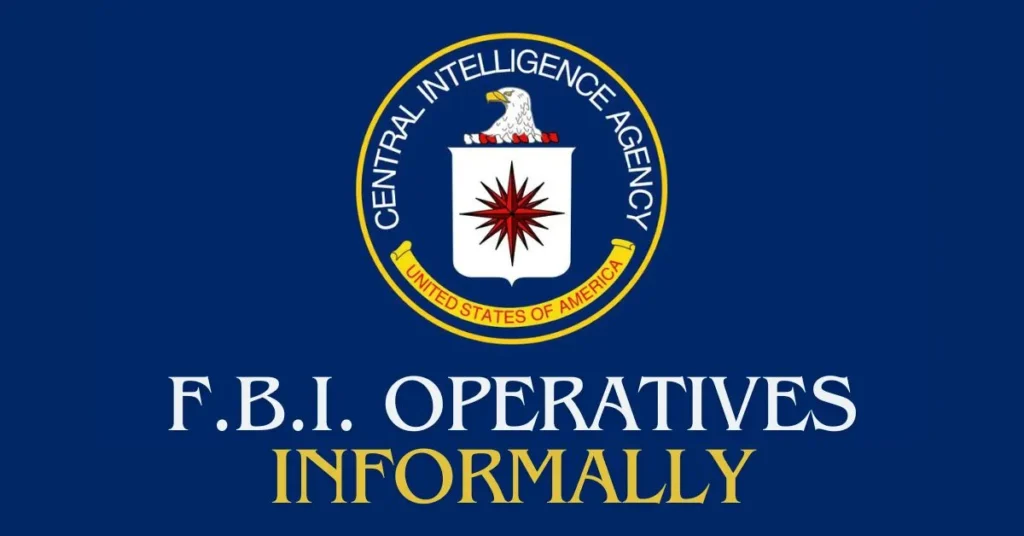When we think of the FBI, images of high-stakes investigations, undercover agents, and sophisticated operations come to mind. But what about the less formal aspects of this esteemed institution? In this article, we’ll dive into the intriguing world of F.B.I. operatives informally. We’ll uncover the human side of these operatives, their everyday lives, and how they navigate the balance between work and personal life.
Behind the Badge: The Real Lives of F.B.I. Operatives
F.B.I. operatives are often depicted in movies and TV shows as stoic, serious individuals. However, in reality, they are just like us. They have families, hobbies, and personal interests. Many F.B.I. operatives informally share stories of juggling their demanding jobs with everyday responsibilities. Imagine trying to explain to your kids why you can’t attend their school play because you’re in the middle of a critical investigation!
The pressure of maintaining a low profile while being constantly vigilant is immense. Yet, these operatives manage to strike a balance. They attend family gatherings, participate in community events, and even coach their kids’ sports teams. It’s this duality that makes their lives so fascinating.
Navigating the Gray Areas:
F.B.I. operatives often operate in gray areas, where the lines between right and wrong can blur. This is particularly true in undercover operations. They have to blend in with criminal elements, sometimes forming bonds with the very people they are investigating. This aspect of their job is both mentally and emotionally taxing.
Informally, operatives discuss the ethical dilemmas they face. Is it ever okay to bend the rules to catch a dangerous criminal? How do they cope with the guilt of deceiving someone who might genuinely trust them? These are the questions that keep F.B.I. operatives awake at night.
The Art of Disguise and Deception:
One of the most intriguing aspects of being an F.B.I. operative is the use of disguises and deception. In their informal discussions, many operatives reveal that mastering the art of disguise is crucial. This doesn’t just mean changing their appearance but also their mannerisms, speech patterns, and even their personalities.
For instance, an operative might need to convincingly play the role of a drug dealer one day and a corporate executive the next. This requires extensive training and a deep understanding of human psychology. The ability to switch personas seamlessly is a skill that sets successful operatives apart from the rest.
The Unseen Heroes: Support Staff
While field agents often get the spotlight, the support staff of the FBI play a vital role. These unsung heroes ensure that operations run smoothly. From analysts who sift through mountains of data to tech experts who provide critical cyber support, the contributions of support staff are invaluable.
Informally, F.B.I. operatives frequently acknowledge the importance of their support teams. Without these dedicated professionals, many investigations would come to a grinding halt. Their behind-the-scenes efforts are crucial to the success of the FBI’s mission.
Balancing Act: Work and Personal Life
Balancing a career as an F.B.I. operative with personal life is no small feat. The nature of their work often means long hours, frequent travel, and sudden, unpredictable assignments. Yet, many operatives manage to maintain strong personal relationships.
Informal gatherings of operatives often turn into therapy sessions, where they share tips and strategies for managing stress and maintaining a healthy work-life balance. These discussions are invaluable for new recruits, who can learn from the experiences of their more seasoned colleagues.
The Importance of Mental Health:
The mental health of F.B.I. operatives is a topic that is gaining more attention. The stress and trauma associated with their work can take a significant toll. Thankfully, the FBI has recognized this and provides extensive mental health support for its employees.
In informal settings, operatives discuss the importance of seeking help and destigmatizing mental health issues. Peer support groups have become an essential resource, providing a safe space for operatives to share their experiences and find comfort in knowing they are not alone.
Training and Preparation:
Becoming an F.B.I. operative requires rigorous training. This includes physical conditioning, tactical training, and extensive coursework in criminal justice and law. But beyond the formal training, there is a wealth of knowledge that operatives gain informally.
Experienced operatives often mentor new recruits, sharing tips and tricks that aren’t covered in the official training manuals. This informal mentorship is crucial, as it helps new operatives acclimate to the demanding nature of their job.
The Role of Technology:
Technology plays a significant role in the operations of F.B.I. operatives. From advanced surveillance equipment to sophisticated data analysis tools, technology is an integral part of their work. Informally, operatives discuss the constant need to stay updated with the latest technological advancements.
The rapid pace of technological change means that operatives must continuously learn and adapt. This is particularly true in the realm of cybersecurity, where the tactics of criminals are constantly evolving. Staying one step ahead requires both formal training and informal knowledge-sharing among operatives.
Community Engagement:
Despite the secretive nature of their work, F.B.I. operatives often engage with their communities. They participate in outreach programs, give lectures on safety and crime prevention, and sometimes even volunteer at local schools. These informal interactions help build trust between the FBI and the public.
Community engagement also provides operatives with valuable insights into local issues and concerns. This grassroots intelligence can be crucial in shaping effective law enforcement strategies.
The Human Side of the FBI:
Ultimately, the informal side of F.B.I. operatives reveals their humanity. They are dedicated professionals who are deeply committed to their work, but they are also individuals with hopes, fears, and dreams. Understanding this human side helps demystify the FBI and fosters a greater appreciation for the sacrifices these operatives make.
In their informal conversations, operatives often reflect on the impact of their work. They talk about the satisfaction of bringing criminals to justice, but also the heartache of seeing the darker side of humanity. These candid discussions offer a glimpse into the emotional complexities of being an F.B.I. operative.
Conclusion:
The world of F.B.I. operatives informally is a fascinating one. It is a world where the professional intersects with the personal, where ethical dilemmas are a daily reality, and where the pressure to succeed is immense. Yet, through it all, these operatives remain committed to their mission of protecting the public.
By exploring the informal side of their lives, we gain a deeper understanding of the challenges and triumphs they experience. We see them not just as agents of the law, but as individuals who navigate a complex and often dangerous world with courage and dedication.







